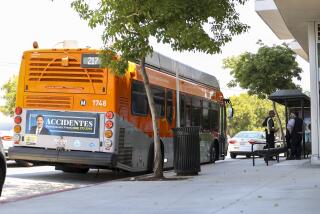City Tries to Keep Station After Funding Derails : Commuting: Santa Clarita looks for ways to pay for a Canyon Country Metrolink stop after FEMA withdraws support.
SANTA CLARITA — The speedy repair of earthquake-damaged freeways has left city officials in a bit of a jam as they try to figure out how to pay for a Metrolink station financed by federal emergency funds that are no longer being provided.
The station in Canyon Country was opened shortly after the Jan. 17 Northridge earthquake to accommodate the large increase in ridership, and it continues to attract about 220 riders daily, said Ron Kilcoyne, the city’s transportation manager.
He said that several funding options are being considered, but that there is a remote possibility the station could be closed.
Federal Emergency Management Agency funds were originally supposed to pay a $10,000 monthly lease for the land on which the station is located until December, when repairs to the Golden State and Antelope Valley freeways were scheduled to be completed.
But both freeways were reopened ahead of schedule and FEMA funding ceased as of July 31.
“The city is determined to keep the station open,” Kilcoyne said. “But the fact is when we planned out all our long-term expenses, this wasn’t one of them.”
The percentage of Santa Clarita Line riders boarding at the Canyon Country station has gradually increased--from about 11% in March to 15% in June--the most recent figures available show, said Metrolink spokesman Peter Hidalgo. The station attracts about one-third of the 750 riders that Santa Clarita’s main Metrolink station in Saugus does, according to city officials.
The cost of maintenance and a security guard are relatively minor, about $10,000 to $20,000 a year, because there are no restrooms or other facilities, Kilcoyne said.
Keeping the station open for a few months is not a problem, but if a long-term source of funding is not found “something else has got to go,” he said. He declined to detail any of the funding alternatives city officials are considering.
Many riders live near the station, while others commute from remote areas east of the city such as Agua Dulce, Kilcoyne said.
More to Read
Sign up for Essential California
The most important California stories and recommendations in your inbox every morning.
You may occasionally receive promotional content from the Los Angeles Times.









